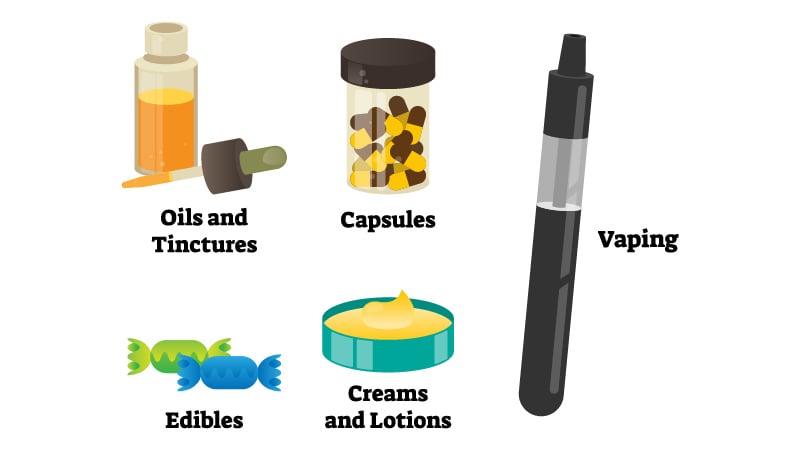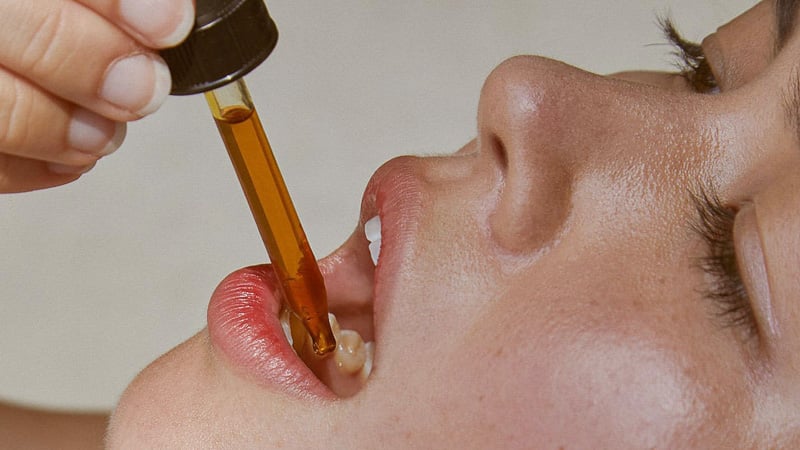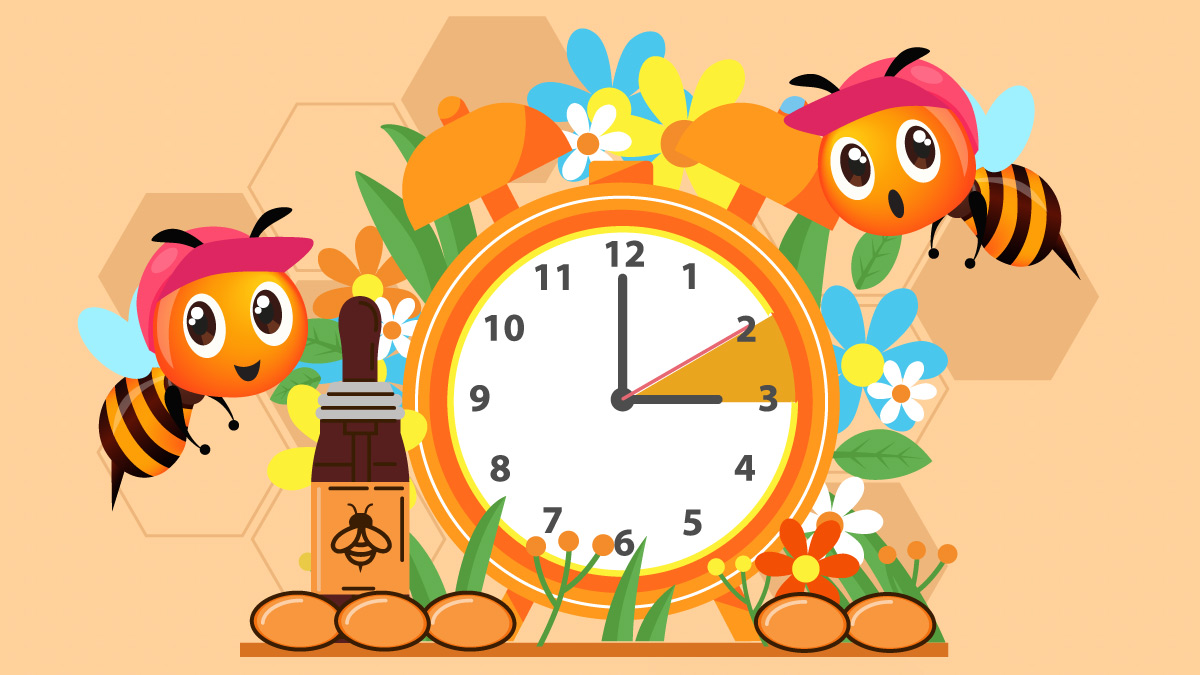Cannabis is a complex plant — and so is its relationship with our bodies.
On top of modulating the endocannabinoid system (ECS), CBD has over 65 molecular targets, affecting a wide range of physiological and mental processes (1–2).
This makes it difficult to gauge precisely how long it will take for CBD oil to work for each individual. Every person is different and has unique body chemistry. People also have varying diets, lifestyles, and struggle with different health concerns.
CBD comes in many forms; each of them affects the absorption rate of the cannabinoid, determining the time CBD oil needs to kick in.
After years of research and advocating for the health benefits of CBD — and using it ourselves — we’ve created a concise guide to the effects of CBD oil: what they are, how long it takes for them to work, and how long they stay with the user.
We’ve also prepared a FAQ section with more detailed questions about this subject.
Factors that Impact CBD Oil Absorption
It may take anywhere from a few minutes to a couple of hours for CBD oil to work. The ultimate time depends on how you consume your CBD, your goals regarding the effects, and the serving size.
The most common forms of CBD include:
- CBD oil – products such as oil drops, tinctures, or sprays, provide relatively fast absorption and long duration of effects. They also offer precise dosing. CBD oil is taken under the tongue, where it gets absorbed through tiny blood vessels.
- CBD vape pen – vaporization offers the fastest absorption rate; the effects of CBD oil are felt almost immediately after the last puff from your vape pen
- Topical CBD – this form relates to a broad range of products, including CBD creams, lotions, gels, balms, bath bombs, and more. The absorption rate varies depending on the product’s formula, but it can take anywhere between 20 minutes and 2 hours until you can experience the effects. Topicals are used for localized relief and skin moisturization.
- Oral CBD products – taking a CBD-infused capsule, gummy bear, or sucking a honey straw straight from the tube is a fun way to enjoy the effects and benefits of CBD. However, since the CBD needs to pass through the digestive system, the effects are delayed by up to 2 hours.
Other important factors determining the time it will take for CBD oil to work include the potency of your product, the serving size, and what you want to alleviate with CBD.
In the next section, we elaborate on the efficacy of different CBD consumption methods.
How Fast Does CBD Work?

It’s advisable to consult a holistic doctor experienced in cannabis use before introducing CBD products to your routine. A consultation with a CBD-friendly professional should help you establish the right dosage and choose the most suitable consumption method for your needs.
Here’s how long it takes for CBD products to work depending on their form — and how long they last.
How Long Does It Take for Oral CBD Products to Work?
Taking CBD capsules have become popular due to their ease of use, convenience, and hassle-free dosage. Each CBD capsule offers a fixed amount of CBD, so there’s not much guesswork involved unlike with CBD oil. Before the CBD enters the bloodstream, it needs to pass through the digestive tract and the liver. From there, it can reach the endocannabinoid system and produce its effects. Due to the “first-pass” metabolism in the liver, the effects of oral CBD have a delayed onset. In the best-case scenario, you may start feeling the effects in as little as 20 minutes, but most people have to wait about 60 minutes to start feeling the effects of CBD capsules. The same pattern applies to edibles such as CBD gummies and honey sticks. As the liver releases CBD gradually into your system, the effects may stick around for up to 10 hours.
How Long Does it Take for Sublingual CBD to Work?
Sublingual CBD products range from CBD oils to tinctures and sprays. They are taken under the tongue for up to 60 seconds before swallowing; doing so allows the CBD to avoid the first-pass metabolism and absorb directly into the bloodstream. Sublingual CBD is considered the second-best form to take CBD if you want the effects to work fast. Typically, it takes around 15–20 minutes to feel the effects of CBD; they usually last for 4–6 hours.
How Long Does It Take for CBD Vape to Work?
Vaporization — inhaling CBD-rich vapor from a vape pen — offers the highest bioavailability of all consumption methods, meaning that you’re getting the most out of your CBD product. That’s because vaping delivers CBD and other compounds of your CBD liquid through the lungs, where they diffuse right into the bloodstream, bypassing the digestive system. The effects are often felt within a minute or two after inhalation, lasting generally for 3–4 hours.
How Long Does It Take for CBD Cream to Work?
Topicals like CBD cream offer many benefits. Studies suggest that the skin has its own endocannabinoid system. When you apply CBD topically, it penetrates the skin barrier, reaching the epidermis layer where CB2 receptors are located. From there, it can produce its soothing and antioxidant effects. In other words, CBD may protect the skin against the damage that causes wrinkles, pigmentation, and other signs of passing time.
The topical method needs more time to take effect than vaporization or sublingual use. People typically report first signs of relief after one hour, but the benefits are longer lasting (up to 8 hours).
What Are the Effects and Benefits of CBD Oil?
As said above, CBD is known to interact with the endocannabinoid system (ECS), which is a vast regulatory network responsible for the body’s ability to maintain homeostasis. This fancy term refers to the balance between all bodily functions; the ECS produces its own chemical messengers (endocannabinoids) that bind to cannabinoid receptors in order to restore that balance whenever it falls out of whack.
CBD and other cannabis compounds have a similar structure to endocannabinoids. They can either bind to the cannabinoid receptors or modulate their activity by signaling the endocannabinoid system to exert certain actions on the body and brain.
A dysfunctional endocannabinoid system can result in a condition known as Clinical Endocannabinoid Deficiency (CECD), which has been recently suggested by researchers as the underlying cause of many chronic ailments.
CBD signals the ECS to produce and maintain higher concentrations of its natural cannabinoids. On top of that, CBD works on several receptor-based and receptor-independent pathways, affecting other systems in the body.
This multifaceted mechanism of action is the reason why CBD has so many health benefits, including (3):
- Better stress management
- Enhanced focus
- Revitalized skin
- Healthy rest
- Invigoration
- Reduced physical discomfort
- The overall sense of balance
- Better post-workout regeneration
- Elevated mood
- Improved alertness
- Relaxation
Unlike its cousin THC, CBD is a non-intoxicant, meaning it won’t get you high. Instead, CBD will block the activity of THC on the CB1 receptors in the brain, resulting in a milder psychoactive effect when these two compounds are taken together.
CBD is found in hemp and selectively-bred high-CBD marijuana strains. Hemp-derived CBD is currently the only federally legal form. CBD from marijuana can be found in states that have legalized its recreational use or, at least, offer some sort of medical marijuana program for patients.
Numerous health agencies, including The World Health Organization (WHO), have classified CBD as a safe and well-tolerated substance without the potential for abuse. According to studies, CBD is as likely to be abused as a placebo (4).
CBD Effects FAQ

We’ve put together the most frequently asked questions about the time it takes for CBD oil to work. Here we explain everything from dosing CBD to establishing the best routine for your supplementation.
1. How Much CBD Oil Should You Take to Feel the Effects?
Determining the best CBD dosage for yourself is easier said than done.
There are no official dosage guidelines in place, nor is there a specific dose that would produce desired effects for everyone.
Everybody is different and reacts differently to CBD oil; the only way to find out how much CBD you need to feel its benefits is to experiment with different dosages.
If you want to take CBD for a general health boost, a dose of 5–10 mg a day should do the trick. Bigger people will need more CBD in their routine, as well as those who have been recommended higher doses by their physician. Others prefer microdosing, which means taking 1–2 mg of CBD every few hours, for biohacking purposes.
The effects of CBD may be felt instantly, but in order to evaluate its full potential, it’s best to give it about 2 weeks so it can consistently work with your endocannabinoid system.
Once you’ve found the effective dose — a.k.a. your recommended serving size, you can lock in at that dosage and stick to it, as people don’t build a tolerance to CBD.
2. Where Should You Start With Dosing CBD?
CBD isn’t a magical pill; it’s an effective tool for improving one’s quality of life, but it’s not a quick fix to all your health problems. There’s no need to rush with large doses unless your doctor has recommended doing so. The best thing you can do is start really low — up to 5 milligrams for a single serving — and gradually work your way up to the effective dose.
3. How Long Do the Effects of CBD Oil Last?
The duration of the effects of CBD oil largely depends on your metabolism. Although the trace amounts of CBD will stay in your system for 2–5 days, these amounts won’t produce any real effects.
Depending on how you consume CBD, its effects will stick around with you for anywhere between 2–10 hours. Here’s how it looks like for each of the common CBD formats:
- CBD oil – up to 6 hours
- CBD vape pens – up to 4 hours
- CBD capsules and edibles – up to 10 hours
- CBD topicals – 8–10 hours
4. Should You Take CBD Oil with Food Or on an Empty Stomach?
Some companies recommend taking their CBD oils on an empty stomach, using the argument that doing so will reduce the time needed for the effects of CBD oil to work. While you can’t argue with that, this approach reduces its overall potency. Since CBD is fat-soluble (it dissolves in fats), any amount that you swallow needs to pass through the digestive system. When you take CBD with hearty food, it will increase its bioavailability, allowing more CBD to enter the body.
When vaping CBD or taking tinctures, you can avoid taking CBD oil with food because the CBD doesn’t have to pass through the liver to start working.
5. What Time During the Day Should I Take CBD for the Best Results?
There is no such thing as “the best time of the day” for taking CBD oil.
Choosing the ideal time to use it depends on how it fits into your work schedule.
For example, when you have a day off, take your dose of CBD oil and monitor how long the effects will stay for you. Write down your CBD goals first, and once you’ve done it, keep track of the effects in a journal or log — this will help you establish the best times during the day to take CBD.
If you find the effects of CBD invigorating, it may be a good idea to use it in the morning or in the afternoon to enhance your productivity. However, if you take large amounts of CBD oil, then you may feel drowsy after each dose. If this is your story, take CBD in the evening to promote healthy rest.
Regardless of the preferred time of the day, make sure that your supplementation is consistent.
A Final Note on How Long It Takes for CBD Oil to Work
The effects of CBD oil may take anywhere from 1 minute to 2 hours to work. Although many factors impact the onset and duration — including your age, overall health, lifestyle habits, and diet — the consumption method appears to be the key player.
The golden mean between the onset of effects, their duration, and bioavailability is the sublingual use. Taking CBD oil in the tongue will likely produce its effects within 15–20 minutes after swallowing it, lasting for up to 6 hours and delivering more CBD to your system than oral forms.
If you don’t mind a slight delay but are looking for longer-lasting effects, consider adding CBD capsules or edibles to your routine.
For the fastest relief, it’s best to vaporize CBD. Doing so will produce the effects within minutes after inhalation at the cost of some duration.
Topical products, in turn, are the preferred method to target localized problems and nourish the skin.
No matter which method you chose, remember to consult your doctor about your CBD supplementation; always start at the low end, and don’t treat CBD as an overnight cure. If your endocannabinoid system is compromised, CBD may need more time to fix the cannabinoid deficiencies in your body.
How long does it take for you to feel the effects of CBD oil? What is your preferred consumption method? Let us know in the comment section!
References:
- Battista, Natalia et al. “The endocannabinoid system: an overview.” Frontiers in behavioral neuroscience vol. 6 9. 14 Mar. 2012, doi:10.3389/fnbeh.2012.00009
- Ibeas Bih, Clementino et al. “Molecular Targets of Cannabidiol in Neurological Disorders.” Neurotherapeutics : the journal of the American Society for Experimental NeuroTherapeutics vol. 12,4 (2015): 699-730. doi:10.1007/s13311-015-0377-3
- Corroon, Jamie, and Joy A Phillips. “A Cross-Sectional Study of Cannabidiol Users.” Cannabis and cannabinoid research vol. 3,1 152-161. 1 Jul. 2018, doi:10.1089/can.2018.0006
- The World Health Organization (WHO). “Cannabidiol: A Critical Review.” Retrieved from: https://www.who.int/medicines/access/controlled-substances/CannabidiolCriticalReview.pdf
